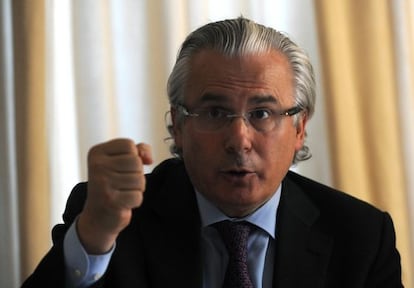Garzón urges Uruguay court to judge dictatorship crimes
South American country’s top justices have recently struck down an amnesty-busting law


Spain’s former High Court judge, Baltasar Garzón, who works as a human rights activist in Argentina, sharply criticized the Supreme Court in neighboring Uruguay on Monday for recently revoking a law which had lifted the statute of limitations regarding crimes committed by the past dictatorship.
“Uruguay has taken a positive and proactive defense approach when it comes to human rights,” he told reporters in Montevideo before given a conference. Garzón explained that the court’s decision runs contrary to international doctrine on human rights, and expressed his wish that the justices would correct their ruling “as soon as possible.”
The repeal of the so-called Statute of Limitations Law of 1985 was approved in 2011 by President José Mujica’s ruling Broad Front (FA) coalition. But the Supreme Court ruled in February that it was unconstitutional. Uruguayans voted in two referendums in 1989 and 10 years later in support of the Statute of Limitations Law.
Garzón, who presides over the Buenos Aires-based International Center for the Promotion of Human Rights, said the court’s decision leaves victims of the dictatorship, which ruled the country from 1973 to 1985, without any legal protection. Uruguayan justice took a decision that goes against international conventions, the Spanish judge said, adding that it contradicts the country’s commitment stemming from when it signed the principles that established the international court at Nuremberg after World War II.
Garzón supports efforts to present a global case against countries which took part in Operation Condor
“If Uruguay was a signatory of the declaration in London in 1945 in which the Nuremberg court was established, I question how a domestic law that was passed later can go against the gist of international criminal law,” he said.
The judge recalled that the Argentinean Supreme Court ruled in 2005 that amnesty laws were unconstitutional in that country. A blanket amnesty law passed during President Carlos Menem’s term in office had effectively quashed guilty verdicts handed down in 1985 to a group of military officials who ruled Argentina from 1976 to 1983.
Garzón, who in 2012 was suspended from his post in Spain’s High Court for 11 years over a misuse of wiretaps against suspects, also said he supported efforts being discussed to present a global case against South American countries which took part in the secret Operation Condor pact, a cross-border conspiracy by military governments to crack down on dissent and leftist groups during the 1970s and 1980s.
“If the area covered by Condor was Bolivia, Argentina, Paraguay, Uruguay and Brazil, and all of the intelligence services acted concertedly to engage in the kidnappings, disappearances and torture of tens of thousands of people, only justice can prevent a similar structure from again being put in place ever again,” he said.
Tu suscripción se está usando en otro dispositivo
¿Quieres añadir otro usuario a tu suscripción?
Si continúas leyendo en este dispositivo, no se podrá leer en el otro.
FlechaTu suscripción se está usando en otro dispositivo y solo puedes acceder a EL PAÍS desde un dispositivo a la vez.
Si quieres compartir tu cuenta, cambia tu suscripción a la modalidad Premium, así podrás añadir otro usuario. Cada uno accederá con su propia cuenta de email, lo que os permitirá personalizar vuestra experiencia en EL PAÍS.
¿Tienes una suscripción de empresa? Accede aquí para contratar más cuentas.
En el caso de no saber quién está usando tu cuenta, te recomendamos cambiar tu contraseña aquí.
Si decides continuar compartiendo tu cuenta, este mensaje se mostrará en tu dispositivo y en el de la otra persona que está usando tu cuenta de forma indefinida, afectando a tu experiencia de lectura. Puedes consultar aquí los términos y condiciones de la suscripción digital.








































